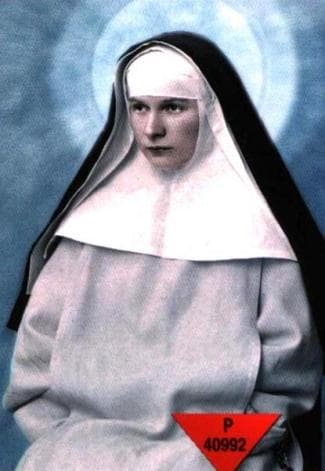
Blessed Julia Rodzinska
Blessed
Feast Day: February 20
Birth: March 16, 1899
Death: February 20, 1945
Biography
Blessed Julia Rodzinska, also known as Stanislawa Rodzinska, Giulia Rodzinska, Mother of Orphans, Apostle of the Rosary, Sister Maria Julia, and prisoner P40992, was born on March 16, 1899, in Nawojowa, Malopolskie, Poland. She was the second of five children born to Michael Rodzinska and Marianna (née Sekuly). Michael, who was the church organist and led the parish choir, also worked at a local bank. Despite coming from a poor but pious family, Marianna's wealthy family refused to provide any assistance, which left the family struggling.
Tragedy struck young Stanislawa when her mother Marianna passed away when she was just eight years old. The family's situation further deteriorated as her father Michael had difficulty managing work and caring for the children. Sadly, he succumbed to pneumonia when Stanislawa was ten years old. Following the death of their parents, Stanislawa and her sister found themselves growing up in a Dominican orphanage, where they received care and education.
Stanislawa developed a deep devotion to the Dominican Sisters during her time at the orphanage, leading her to join the order in 1916 in Tarnobrzegu-Wielowsi, Poland. Taking the name Sister Maria Julia, she made her religious profession on August 5, 1924. For the next 22 years, Sister Maria Julia served as an exceptional and beloved teacher at Dominican orphanages.
In 1934, Sister Maria Julia was appointed as the Superior of the Dominican house in Vilnius, Lithuania. She also took charge of running the orphanage there, becoming known as the Mother of Orphans due to her tireless dedication to caring for the children. Sister Maria Julia's devotion to the Rosary led to her being recognized as an "Apostle of the Rosary." Her profound commitment and compassionate work in Vilnius earned her recognition and distinction from the secular government of the city.
However, Sister Maria Julia's life took a drastic turn when the government seized the school and orphanage, taking over their administration and dissolving the monastery. With no place to go, Sister Julia and her fellow Dominican sisters were kindly taken in by local Vincentian sisters. They faced numerous challenges, including the economic downturn caused by the Nazi invasion and the subsequent suppression of the Church. Under the Nazi regime, teaching Polish culture became illegal, making all aspects of Sister Julia's life and work against the laws of the invaders.
Undeterred, Sister Julia continued covertly teaching children catechism and regular school subjects while also assisting elderly priests who had been forcefully expelled from their homes by the Nazis. Her resilience and determination to uphold her faith and help others made her a target for the Gestapo. Consequently, Sister Julia was arrested on July 12, 1943, and imprisoned for a year in solitary confinement at Lukiškes Prison in central Vilnius.
Despite the small and cramped cement cell in which she was confined, Sister Julia did not break. She persevered in her spiritual exercises throughout her imprisonment. In July 1944, she was transported to the Stutthof concentration camp, where she endured unimaginable suffering, including torture, starvation, and abuse. However, even in the midst of such extreme circumstances, Sister Julia formed prayer groups and shared the little food she received with others.
Tragically, Sister Julia contracted a fatal case of typhus while caring for infected Jewish female prisoners. She passed away on February 20, 1945, in the Nazi prison camp in Sztutowo (Stutthof), Pomorskie, occupied Poland. Her unwavering faith, selflessness, and dedication to serving others, even in the face of immense adversity, led to her recognition as a martyr.
Blessed Julia Rodzinska was venerated by Pope John Paul II on March 26, 1999, with a decree of martyrdom. She was beatified by the same pope on June 13, 1999. Notably, she was the only Dominican woman included among the 108 Martyrs of World War II. Her feast days are celebrated on February 20 and June 12, in commemoration of her inclusion in the group of 108 Martyrs of World War II.